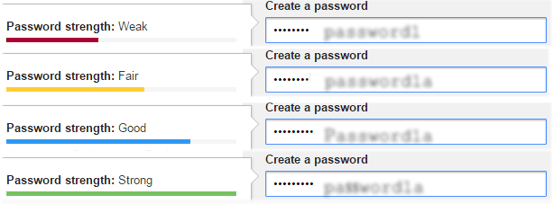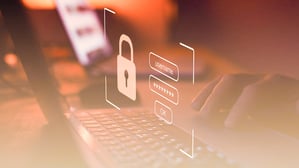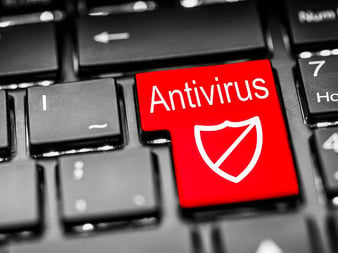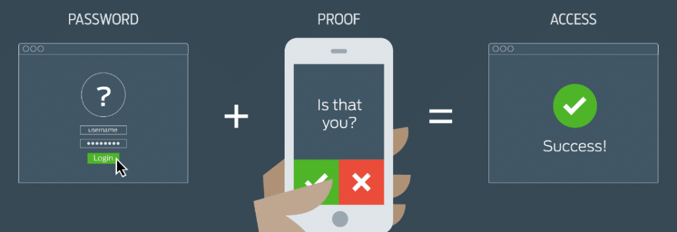Cybersecurity is one of the most talked about subjects in the technology field. Having your business data secured is crucial, but there are ways to stay protected. Here are some ways to help you keep your data protected with these security practices we should all do to ensure cybersecurity!
Changing Passwords/Password Strength
Password safety cannot be stressed enough! Changing your passwords every 60-90 days will allow your information to stay protected. With that, your cyber security will continue to increase.

Not only will changing your password help, but also make sure it is STRONG. Adding symbols, numbers, and making sure the length is 8 or more characters will help keep the password strong. In the example presented above, pa$$word1a has a stronger password strength than password1 (please don’t use the example above for your next password).
Using a phrase and incorporating shortcut codes and acronyms will keep the password strong while being able to remember your favorite phrase or saying. Some examples are 2BorNot2B_ThatIsThe? (To be or not to be, that is the question) or ABT2_uz_AMZ! (About to use Amazon). Unique passwords are harder to break through than weak and simple passwords (please do not use any examples given above).
When selecting a password, do not use any personal information! Using personal information can lead to hackers knowing the answers to your security questions.
Examples of personal information to not use:
Your name
Age
Date of birth
Child’s name
Pet’s name
Favorite color/song
Don’t Use The Same Password For Everything!
Using the same password for multiple logins will cause a bigger issue than you may think. Having the same password for your banking, company sites, or even your email will allow hackers to get into multiple accounts rather than just the one they got into.

Having different passwords will increase your cyber security to allow your data to be protected. It seems hard at first, but having that variety will allow not only your company's information to stay safe, but your own personal data will continue to stay protected.
Using A Password Manager
A password manager is a program that allows users to store, generate, and manage their passwords for local applications and online services. It assists in generating and retrieving complicated passwords, storing the passwords in an encrypted database, or calculating them on demand.
Having this will alleviate having to write your passwords down on a piece of paper. Writing your passwords on paper or even putting them on a Word/Google document will create an easier passage for hackers to get into your information and cause malicious attacks.
Updating Your Antivirus
 Your antivirus is used to prevent, scan, detect and delete viruses from a computer. But what happens when you don’t update your antivirus?
Your antivirus is used to prevent, scan, detect and delete viruses from a computer. But what happens when you don’t update your antivirus?
There are always new viruses developing and keeping your computer clean from them is important. When you don’t update your antivirus, it won’t protect against the newest threats, leading it to believe that it is nothing to worry about. You might not be as protected from cybersecurity risks as you might think. Even worse, your device could be at risk of the latest threats that your security product is not yet aware of. Making sure you are updated on the latest software could relieve all stress in not knowing whether or not you are protected from any threats. This will continue to add that extra layer of cyber security you need.
Installing Multi-Factor Authentication

Multi-Factor Authentication is a security technology that requires multiple methods of authentication from independent categories of credentials to verify a user’s identity for a login or other transaction. Having that extra layer of protection will allow your data to be protected while making it difficult for any malicious attacks to happen.
Once you log in, you will get a prompt on your phone asking if it is you with the name and address that are trying to log in to your account. When you see the pop-up, you have to click accept or deny. After you accept that it is you, you will be let in! This is just another layer of cyber security that will help protect your data. DENY any user that is not you logging in!
Phishing Training
Phishing training is IMPORTANT! Malicious attacks are happening within your email. Clicking on one bad link could lead to a data breach. Knowing how to identify a phishing scam could not only impact your company data but also your personal information. Phishing training allows you to see simulations of different ways a threat email can come through for you to identify.
Identifying an email could seem harder than you think. Hackers have been able to make it so users think the email is coming from someone reputable within your company. We have broken down the ways to identify phishing emails in our post “Phishing Emails – Ways To Detect and Prevent Attacks,” but having an added layer of security by taking phishing training will decrease your chances of malicious attacks.
Click here for more information about PCS.

